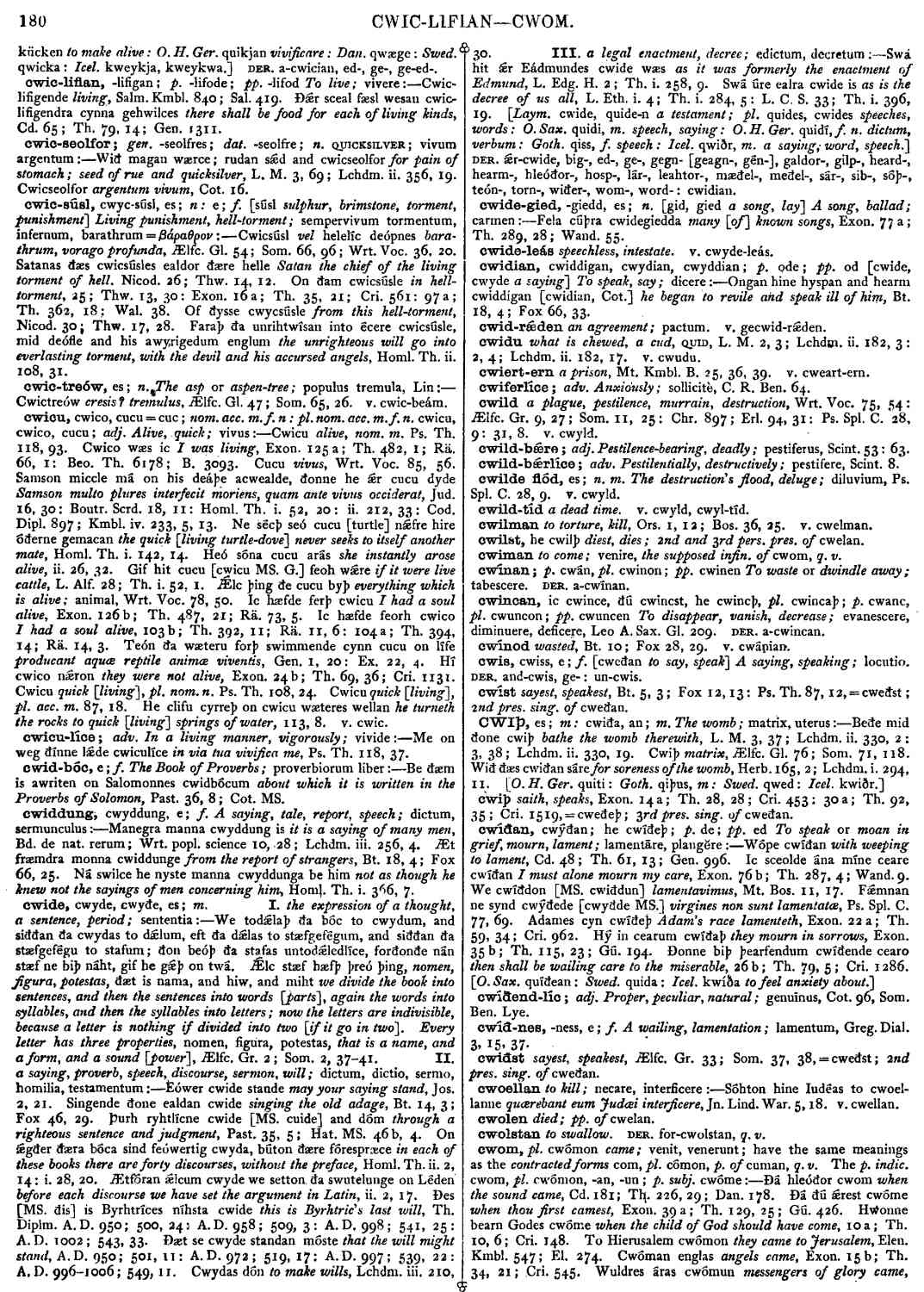cwide
- noun [ masculine ]
-
We todǽlaþ ða bóc to cwydurn, and siððan ða cwydas to dǽlum, eft ða dǽlas to stæfgefégum, and siððan ða stæfgefégu to stafum; ðon beóþ ða stafas untodǽledlíce, forðonðe nán stæf ne biþ náht, gif he gǽþ on twá. Ǽlc stæf hæfþ þreó þing,
nomen, figura, potestas, ðæt is nama, and hiw, and miht we divide the book into sentences, and then the sentences into words [parts], again the words into syllables, and then the syllables into letters; now the letters are indivisible, because a letter is nothing if divided into two [if it go in two]. Every letter has three properties, nomen, figura, potestas, that is a name, and a form, and a sound [power ],
- Ælfc. Gr. 2 ;
- Som. 2, 37-41.
-
Eówer cwide stande
may your saying stand,
- Jos. 2, 21.
-
Singende ðone ealdan cwide
singing the old adage,
- Bt. 14, 3;
- Fox 46, 29.
-
Þurh ryhtlícne cwide [MS. cuide] and dóm
through a righteous sentence and judgment,
- Past. 35, 5;
- Hat. MS. 46b, 4.
-
On ǽgðer ðæra bóca sind feówertig cwyda, búton ðære fórespræce
in each of these books there are forty discourses, without the preface,
- Homl. Th. ii. 2, 14: i. 28, 20.
-
Ætfóran ǽlcum cwyde we setton ða swutelunge on Léden
before each discourse we have set the argument in Latin,
ii.- 2, 17.
-
Ðes [MS. ðis] is Byrhtríces níhsta cwide
this is Byrhtric's last will,
- Th. Diplm. A. D. 950 ;
- 500, 24: A. D. 958 ;
- 509, 3: A. D. 998 ;
- 541, 25: A. D. 1002 ;
- 543, 33.
-
Ðæt se cwyde standan móste
that the will might stand,
- A. D. 950 ;
- 501, 11: A. D. 972 ;
- 519, 17: A. D. 997 ;
- 539, 22: A. D. 996-1006 ;
- 549, 11.
-
Cwydas dón
to make wills,
- Lchdm. iii. 210, 30.
-
Swá hit ǽr Eádmundes cwide wæs
as it was formerly the enactment of Edmund,
- L. Edg. H. 2 ;
- Th. i. 258, 9.
-
Swá úre ealra cwide is
as is the decree of us all,
- L. Eth. i. 4 ;
- Th. i. 284, 5: L. C. S. 33 ;
- Th. i. 396, 19.
Bosworth, Joseph. “cwide.” In An Anglo-Saxon Dictionary Online, edited by Thomas Northcote Toller, Christ Sean, and Ondřej Tichy. Prague: Faculty of Arts, Charles University, 2014. https://bosworthtoller.com/6976.
Checked: 1